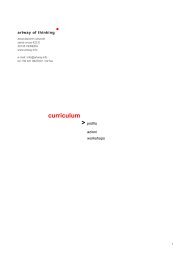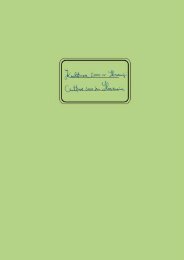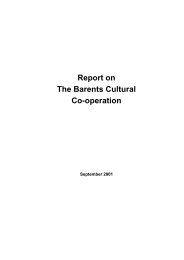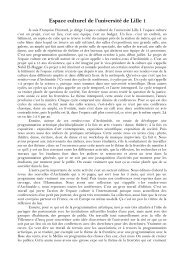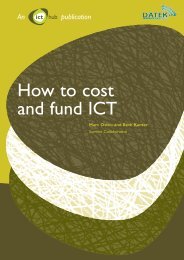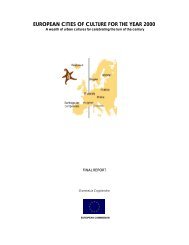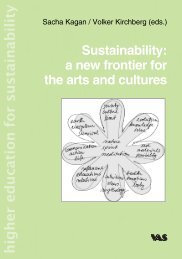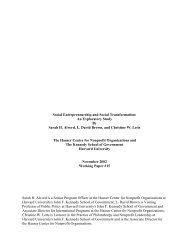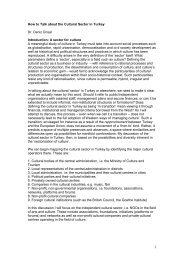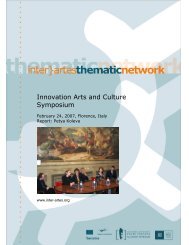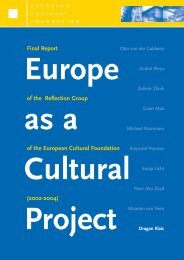A guide to the export and import of cultural goods between Russia ...
A guide to the export and import of cultural goods between Russia ...
A guide to the export and import of cultural goods between Russia ...
Create successful ePaper yourself
Turn your PDF publications into a flip-book with our unique Google optimized e-Paper software.
Czech Republic<br />
Chapter 3: European Union Member States<br />
To apply for a Certificate, <strong>the</strong> owner must make <strong>the</strong> application (or issue a letter <strong>of</strong> at<strong>to</strong>rney<br />
<strong>to</strong> authorise a third party <strong>to</strong> deal with it). You should apply <strong>to</strong> ei<strong>the</strong>r <strong>the</strong> Ministry <strong>of</strong><br />
Culture or one <strong>of</strong> <strong>the</strong> many Specialist Organisations who also issue Certificates. The Specialist<br />
Organisations are listed in Annex No. 2 <strong>of</strong> Act No. 71/1994. Each covers a different<br />
geographical terri<strong>to</strong>ry as well as having a specialist field <strong>of</strong> knowledge, depending on <strong>the</strong><br />
type <strong>of</strong> object. If you are resident in <strong>the</strong> Czech Republic, you apply <strong>to</strong> <strong>the</strong> Specialist Organisation<br />
for <strong>the</strong> region where you live. If you are not resident, you apply <strong>to</strong> <strong>the</strong> Specialist<br />
Organisation in <strong>the</strong> region where <strong>the</strong> object was located at <strong>the</strong> time <strong>of</strong> its acquisition.<br />
The application forms are in Annexes No. 3 <strong>and</strong> 4 <strong>of</strong> Act No. 71/1994. They must be completed<br />
in quadruplicate. The owner must make <strong>the</strong> object available for examination <strong>and</strong><br />
cooperate with <strong>the</strong> relevant authorities.<br />
According <strong>to</strong> <strong>the</strong> legislation, <strong>the</strong> Specialist Organisation should deliver <strong>the</strong> Certificate<br />
within 21 days <strong>of</strong> <strong>the</strong> application being received. If, after examination, it decides not <strong>to</strong> issue<br />
a Certificate, it will refer <strong>the</strong> application <strong>to</strong> <strong>the</strong> Ministry <strong>of</strong> Culture who <strong>the</strong>n have three<br />
months <strong>to</strong> make a decision on whe<strong>the</strong>r <strong>to</strong> issue a Certificate.<br />
A Certificate for temporary <strong>export</strong> may be issued for a period <strong>of</strong> no longer than five years,<br />
while a Certificate for permanent <strong>export</strong> is valid for three years from <strong>the</strong> date <strong>of</strong> issue.<br />
For <strong>the</strong> Permit, you need <strong>to</strong> consult Act No. 122/2000. This covers objects which are part <strong>of</strong><br />
collections <strong>of</strong> museum character, i.e. any collection that is “significant for prehis<strong>to</strong>ry, his<strong>to</strong>ry,<br />
art, literature, technology, natural or social sciences”. Such objects are recorded in central<br />
records maintained by <strong>the</strong> Ministry <strong>of</strong> Culture. Cultural objects covered by this legislation include<br />
all publicly owned collections permanently located in <strong>the</strong> Czech Republic as well as<br />
objects meeting <strong>the</strong> criteria which are owned by private individuals <strong>and</strong> o<strong>the</strong>r organisations.<br />
Act No. 122/2000 mostly contains provisions for <strong>the</strong> protection <strong>of</strong> <strong>the</strong>se objects through<br />
documentation in <strong>the</strong> Central Registry <strong>and</strong> o<strong>the</strong>r responsibilities for <strong>the</strong> owners <strong>of</strong> <strong>the</strong> objects.<br />
Section 11 deals with <strong>the</strong> Export <strong>of</strong> collections abroad. A Permit will only be issued<br />
for such objects for <strong>the</strong> purposes <strong>of</strong> exhibition, conservation or res<strong>to</strong>ration, or scientific<br />
study, <strong>and</strong> only for a limited period <strong>of</strong> time. Therefore, if you want <strong>to</strong> <strong>export</strong> a <strong>cultural</strong><br />
object which is listed in <strong>the</strong> Central Registry, you will only be able <strong>to</strong> get permission for<br />
temporary <strong>export</strong>.<br />
Once you have <strong>the</strong> Certificate or Permit, you can <strong>the</strong>n apply for <strong>the</strong> EU <strong>export</strong> licence.<br />
There are special forms for this which can be obtained from <strong>the</strong> Ministry <strong>of</strong> Culture (Department<br />
<strong>of</strong> Moveable Cultural Heritage, Museums <strong>and</strong> Galleries). You must submit <strong>the</strong><br />
Certificate or Permit with your application <strong>to</strong> <strong>the</strong> Ministry <strong>of</strong> Culture. It issues <strong>the</strong> EU <strong>export</strong><br />
licence within a maximum <strong>of</strong> ten days <strong>of</strong> receiving <strong>the</strong> application. Only <strong>the</strong> st<strong>and</strong>ard<br />
licence is available in <strong>the</strong> Czech Republic (see Chapter 2 for more information) which is<br />
valid for twelve months from <strong>the</strong> date <strong>of</strong> issue.<br />
Since <strong>the</strong> application process is cumulative, in planning your <strong>export</strong>, you must allow<br />
enough time <strong>to</strong> apply first for <strong>the</strong> Certificate/Permit <strong>and</strong> <strong>the</strong>n for <strong>the</strong> EU <strong>export</strong> licence.<br />
64



